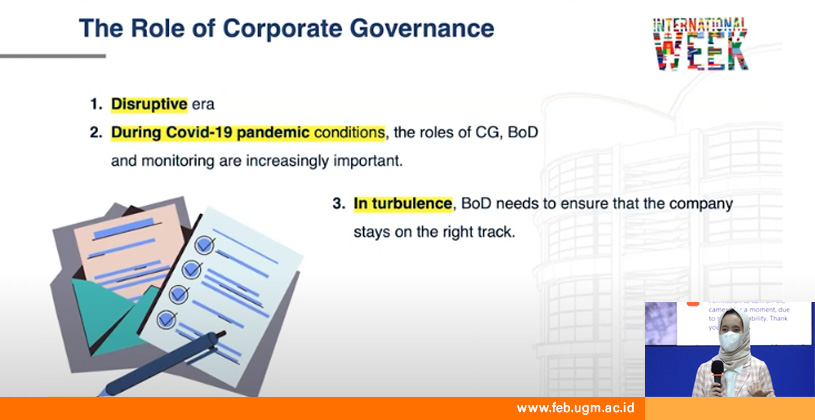Corporate governance is needed to minimize risk and increase transparency
- Details
- Written by FEB UGM
- Category: News
- Hits: 1783

If defined, corporate governance can be interpreted as matters relating to or about how a company is governed. The related topic titled as “The role of Corporate Governance in a Disruptive Era” was discussed on Tuesday (05/07) in a series of lectures as part of a virtual summer program held by the Faculty of Economics and Business, Universitas Gadjah Mada (FEB UGM), namely International Week (iWeek) 2022. On the day of the event, the lecture series presented an expert speaker on the topic, namely Heyvon Herdhayinta, Ph.D., as a Lecturer at FEB UGM.
At the beginning of her presentation, Heyvon explained that corporate governance involves a set of relationships among a company's management, its board, shareholders, and other stakeholders. In addition, she also explained about agency theory which is the most important and most influential theory of corporate governance. Agency theory elaborates on the management relationship between principals (owners) and agents (managers). Whenever in a contract, one party therefore needs to monitor the other party and finds ways to ensure that interests are aligned.
Furthermore, according to Heyvon's explanation, the board is a central corporate governance mechanism that has two pivotal roles, namely monitoring and advisory. The aims of corporate governance mechanisms are to ensure that managers work in the best interests of shareholders (as a collective), minimize agency problems, set frameworks for contractual relationships, and construct a sound economy.
In the midst of the Covid-19 pandemic, the role of corporate governance, the Board of Directors, and monitoring are increasingly important. In turbulence, the Board of Directors needs to ensure that the company stays on the right track. Heyvon emphasized several reasons why corporate governance is so important during the pandemic situation we are going through. The first is due to the demands of stakeholders, especially listed firms, in terms of transparency and accountability. In addition, there are also demands from regulators, to provide and develop infrastructure needed. Problems also arise when the crisis increases and income decreases, especially in terms of compensation, then corporate governance is needed. Corporate governance is also needed to minimize risk and enhance transparency through highly qualified governance.
Reportage: Kirana Lalita Pristy
Watch the full video: https://youtu.be/mGFY3WEkaJI


